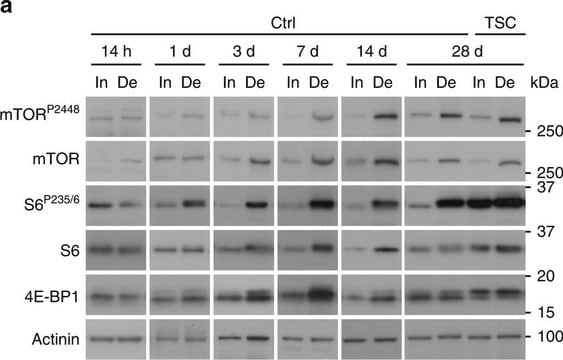05-384
Anti-α-Actinin Antibody, clone AT6/172
clone AT6/172, Upstate®, from mouse
Synonym(s):
Anti-BDPLT15
About This Item
Recommended Products
biological source
mouse
Quality Level
antibody form
purified immunoglobulin
antibody product type
primary antibodies
clone
AT6/172, monoclonal
species reactivity
rabbit, human, mouse
manufacturer/tradename
Upstate®
technique(s)
immunocytochemistry: suitable
western blot: suitable
isotype
IgG1
NCBI accession no.
UniProt accession no.
shipped in
dry ice
target post-translational modification
unmodified
Gene Information
human ... ACTN1(87)
Specificity
Immunogen
Application
Cell Structure
Cytoskeleton
Quality
Target description
Physical form
Storage and Stability
Analysis Note
Positive Antigen Control: Catalog #12-301, non-stimulated A431 cell lysate. Add 2.5µL of 2-mercaptoethanol/100µL of lysate and boil for 5 minutes to reduce the preparation. Load 20µg of reduced lysate per lane for minigels.
Legal Information
Disclaimer
Not finding the right product?
Try our Product Selector Tool.
Storage Class Code
12 - Non Combustible Liquids
WGK
WGK 2
Flash Point(F)
Not applicable
Flash Point(C)
Not applicable
Certificates of Analysis (COA)
Search for Certificates of Analysis (COA) by entering the products Lot/Batch Number. Lot and Batch Numbers can be found on a product’s label following the words ‘Lot’ or ‘Batch’.
Already Own This Product?
Find documentation for the products that you have recently purchased in the Document Library.
Our team of scientists has experience in all areas of research including Life Science, Material Science, Chemical Synthesis, Chromatography, Analytical and many others.
Contact Technical Service






![E-64 N-[N-(L-3-Trans-carboxirane-2-carbonyl)-L-leucyl]-agmatine](/deepweb/assets/sigmaaldrich/product/structures/168/240/c77e3f6a-6709-4d17-b774-b850e8a54a51/640/c77e3f6a-6709-4d17-b774-b850e8a54a51.png)